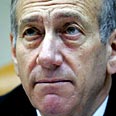
Ceasefire in works
US, French diplomats working on new formula that would lead to ceasefire in North; new proposal may be submitted to UN by Friday; sources say agreement based on French military deployment on northern border. Senior Israeli official: Revised UN Resolution will stop short of requiring peacekeepers to disarm Hizbullah
According to various reports, the agreement is based on the deployment of French troops on the northern border along with UNIFIL and Lebanese army forces. UN officials expressed optimism regarding the plan but are still waiting for approval from Jerusalem and Beirut.
According to sources in Jerusalem, the new formula is premised on four components:
1. The deployment of a genuine military forces, apparently French and German, in southern Lebanon
2. The implementation of Resolution 1559
3. Negotiations on a prisoner swap
4. The establishment of a mechanism for future Israeli-Lebanese dealings
French Foreign Minister Philippe Douste-Blazy said that an agreement on a Security Council proposal for an end to the fighting in Lebanon will be worked out shortly. According to the French minister, "things started moving in New York."
The American-French draft resolution has been forwarded to both Israel and Lebanon for approval. Israel's UN Ambassador Danny Gillerman said the new proposal envisions the IDF staying in Lebanon until it is replaced by a multinational force. Israel hopes such force would have a mandate to deploy across the region and prevent the transfer of weapons from Iran and Syria.
The proposal being formulated followed a meeting Thursday morning between the American and French UN ambassadors, and still needs to be approved by Britain, Russia and China before being presented to the Security Council. American officials again stressed the need to avoid a gap between words and deeds on the ground, in order to avoid a return to the reality that prevailed before July 12.
'This decision is difficult'
According to various reports, the multinational forces being designed for this end includes Lebanese troops, UNIFIL forces, and several thousand French soldiers who are already in the region and can be deployed quickly, at least temporarily, until a more efficient and powerful international force is created. French soldiers are slated to play a major role in such force as well.
According to estimates, Hizbullah will be interested in a ceasefire and will end its rocket fire once a truce is declared, while continuing to fight against IDF forces in Lebanon.
A senior Israeli official said the revised UN Resolution will stop short of requiring peacekeepers to disarm Hizbullah but will call for an embargo to prevent the group from bringing in arms from Iran and Syria.
Kadima Knesset Member Otniel Otniel Schneller met with Prime Minister Ehuld Olmert, who told him that "at this time, a new diplomatic formula with positive implications that could end the fighting is being formulated. If it isn't accepted, Israel will take off the gloves."
Schneller said that he left the meeting with a good feeling and was impressed that the prime minister is decisive.
"At this time there's an attempt to produce a new diplomatic draft, and if what I saw will indeed materialize it would be fabulous. It would prevent Israeli victims," he said.
Schneller added that during the meeting, Olmert received a letter from one of the families who lost their loved ones in Lebanon.
"The letter only strengthened the prime minister, but I also saw dampness in his eyes – this is in fact the dilemma, bringing about a diplomatic agreement or continuing the battle. This decision is difficult both rationally and emotionally," Schneller concluded.
During a Jerusalem meeting with US Assistant Secretary of State David Welch Olmert stressed the importance of the deployment of an international force with enforcement capabilities, the immediate return of the kidnapped IDF troops, the preserving of Israel’s right to retaliate in case of rocket attacks, the withdrawal of Hizbullah from south Lebanon and an embargo on arms sales to the terror group.
News agencies contributed to the report















